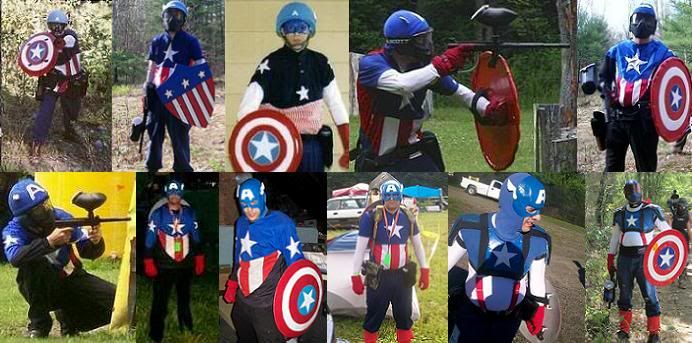Post by Captain America on Jul 5, 2010 20:27:50 GMT -5
At any field you go to, anywhere in the world, if you hang out long enough and talk to the patrons, the discussion will inevitably venture into the topic of tactics and strategies. Depending on what style of play is your personal default, your approach to tactics will vary greatly.
This was evidenced for my team and I last year when we began attending the Sunday games at a local field here in upstate New York, Lash's Paintball and Air Soft. Most of the guys playing there only knew speedball and were all quite young to boot. The dominance of speedball with the patrons at Lash's made little sense when one considers that their entire field is surrounded by excellent woods and they did, in fact, have several woods ball fields set up and ready to play.
After the first game or two, the kids' lack of seasoning became apparent to anyone who knew what they were looking at and what they needed to look for. They generally all ran up to the very first bunker they could and then fought from there for the rest of the game, maybe occasionally moving up to the next row of bunkers, but most likely not. That is, obviously, poor tactics. If you stay in one spot for too long, your opponents will know where you are and, more importantly, they'll have the opportunity to move while you sit still, leaving you as the proverbial "sitting duck" we hear talk of so often.
My team, the Avengers, were founded as a woods ball team. In the woods, we don't have the luxury of bunkers. If you run into a hail of fire and all there is for cover is a couple of saplings and a bush, well, you are just going to have to make due with what you have, right? For the Avengers, playing in the woods has made us develop skills and a mindset for tactics that we may not have learned otherwise.
We also learned very, very quickly to keep moving and for god's sakes, plan your move out in advance. You need to have a destination in mind and a path to get there, usually with a secondary route in mind just in case the opposition has your movements pegged. Running out there without thinking generally leads to getting covered in paint. We've all had it happen at some point or another, don't deny it. Sure, it isn't exactly the most fun and entertaining part of this sport, but it happens to the best of us and there's no point becoming angry and beating oneself up over it. The key to becoming a skilled player is to learn from the mistakes we make and then to committing ourselves to not repeating them.
Another thing that struck us as odd was that none of the kids at the field were talking or yelling to one another. Communication levels were at zero with this crew. Everyone was always so d**n quiet. Communication is a big, big part of strategy, especially in speed ball. Those kids quickly saw that for themselves when they heard my guys calling out positions of opposing players to each other. If you keep communication with your teammates open, it's easier to make sure everyone is on the same page and all following the same plan of attack. A team that communicates together dominates together. By yelling out positions to your teammates, it gives them a chance to keep themselves safe from incoming fire from that particular opponent and it allows them to potentially eliminate the identified player. Neither of these things would be possible without pure blind luck if you hadn't called out the position to your team. See where I'm going with this?
By the end of the summer, we had the guys at Lash's using bunkers wisely, communicating with their teammates, simply by leading from example. It goes to show that no matter what your level of experience, you can always learn a thing or two from someone else.
That in itself is another element of good strategy…keep an open mind. People who have more play time have more experience by the very definition. Pick their brains, ask a lot of questions and see what they found worked and didn't work and why. Not everything you are able to glean from them will be useful but bear in mind that what doesn’t necessarily seem valuable at that moment might just end up being the tide turner for you in a future game situation.
Before the referee signals for the start of the game, take the time to discuss with the other members of your team what strategies you and they will be looking to employ in that particular game. Make sure your movement paths aren't going to interfere or hinder your teammates' and vice versa.
If one guy is hitting the left side of the field, you might want to try the center or right half. It's best not to crowd one side of the field with players. That's an all too common mistake I see time after time. Clustering together limit's the space each individual has to seek cover and makes it easier for your opponents to eliminate you.
Another advantage that you garner for your team by spreading yourselves out like I've suggested is that it will allow you to control the field. By not clustering together in one area, you and your teammates will be better able to control the field's movement and firing lanes.
Combine this with proper communication and well plotted movements for yourself and your teammates and you will be able to control and dominate each and every game.
Do it enough, and other players will take notice and follow suit, forcing themselves to get better and offer you more of a challenge, thus forcing you and your team to improve. It really is a win-win situation when you think about it. A little strategy and thought will increase the enjoyment levels for everyone involved.
This was evidenced for my team and I last year when we began attending the Sunday games at a local field here in upstate New York, Lash's Paintball and Air Soft. Most of the guys playing there only knew speedball and were all quite young to boot. The dominance of speedball with the patrons at Lash's made little sense when one considers that their entire field is surrounded by excellent woods and they did, in fact, have several woods ball fields set up and ready to play.
After the first game or two, the kids' lack of seasoning became apparent to anyone who knew what they were looking at and what they needed to look for. They generally all ran up to the very first bunker they could and then fought from there for the rest of the game, maybe occasionally moving up to the next row of bunkers, but most likely not. That is, obviously, poor tactics. If you stay in one spot for too long, your opponents will know where you are and, more importantly, they'll have the opportunity to move while you sit still, leaving you as the proverbial "sitting duck" we hear talk of so often.
My team, the Avengers, were founded as a woods ball team. In the woods, we don't have the luxury of bunkers. If you run into a hail of fire and all there is for cover is a couple of saplings and a bush, well, you are just going to have to make due with what you have, right? For the Avengers, playing in the woods has made us develop skills and a mindset for tactics that we may not have learned otherwise.
We also learned very, very quickly to keep moving and for god's sakes, plan your move out in advance. You need to have a destination in mind and a path to get there, usually with a secondary route in mind just in case the opposition has your movements pegged. Running out there without thinking generally leads to getting covered in paint. We've all had it happen at some point or another, don't deny it. Sure, it isn't exactly the most fun and entertaining part of this sport, but it happens to the best of us and there's no point becoming angry and beating oneself up over it. The key to becoming a skilled player is to learn from the mistakes we make and then to committing ourselves to not repeating them.
Another thing that struck us as odd was that none of the kids at the field were talking or yelling to one another. Communication levels were at zero with this crew. Everyone was always so d**n quiet. Communication is a big, big part of strategy, especially in speed ball. Those kids quickly saw that for themselves when they heard my guys calling out positions of opposing players to each other. If you keep communication with your teammates open, it's easier to make sure everyone is on the same page and all following the same plan of attack. A team that communicates together dominates together. By yelling out positions to your teammates, it gives them a chance to keep themselves safe from incoming fire from that particular opponent and it allows them to potentially eliminate the identified player. Neither of these things would be possible without pure blind luck if you hadn't called out the position to your team. See where I'm going with this?
By the end of the summer, we had the guys at Lash's using bunkers wisely, communicating with their teammates, simply by leading from example. It goes to show that no matter what your level of experience, you can always learn a thing or two from someone else.
That in itself is another element of good strategy…keep an open mind. People who have more play time have more experience by the very definition. Pick their brains, ask a lot of questions and see what they found worked and didn't work and why. Not everything you are able to glean from them will be useful but bear in mind that what doesn’t necessarily seem valuable at that moment might just end up being the tide turner for you in a future game situation.
Before the referee signals for the start of the game, take the time to discuss with the other members of your team what strategies you and they will be looking to employ in that particular game. Make sure your movement paths aren't going to interfere or hinder your teammates' and vice versa.
If one guy is hitting the left side of the field, you might want to try the center or right half. It's best not to crowd one side of the field with players. That's an all too common mistake I see time after time. Clustering together limit's the space each individual has to seek cover and makes it easier for your opponents to eliminate you.
Another advantage that you garner for your team by spreading yourselves out like I've suggested is that it will allow you to control the field. By not clustering together in one area, you and your teammates will be better able to control the field's movement and firing lanes.
Combine this with proper communication and well plotted movements for yourself and your teammates and you will be able to control and dominate each and every game.
Do it enough, and other players will take notice and follow suit, forcing themselves to get better and offer you more of a challenge, thus forcing you and your team to improve. It really is a win-win situation when you think about it. A little strategy and thought will increase the enjoyment levels for everyone involved.






